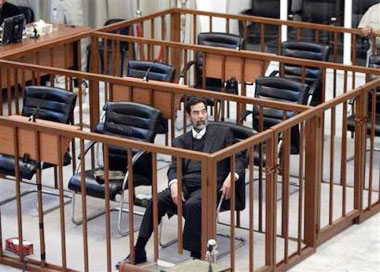BAGHDAD, Iraq - Saddam Hussein dodged questions from prosecutors
cross-examining him for the first time Wednesday over a crackdown against
Shiites in the 1980s. But he acknowledged approving death sentences for 148
Shiites, saying he was convinced they tried to assassinate him.
At times sharp and combative but often relaxed or even smiling, the former
Iraqi leader declined to confirm his signature on documents. When prosecutors
presented identity cards of children whose death sentences they said he signed,
he maintained they were forged.

Former Iraqi President
Saddam Hussien sits alone in the defendant's cage during cross-examination
at his trial held in Baghdad's heavily fortified Green Zone, Wednesday
April 5, 2006. Saddam Hussein was cross-examined for the first time in his
six-month-old trial Wednesday, saying he approved death sentences against
Shiites in the 1980s because he believed the evidence had proven they were
involved in an assassination attempt against him.
[AP] |
"You can buy IDs like this in the
market," Saddam said. "Is it the responsibility of the head of the state to
check the IDs of defendants and see how old they are?"
Standing alone in a black suit in the defendants' pen, Saddam refrained from
the outbursts he has made in previous sessions. But he denounced the court as
"illegitimate" and attempted to tap into Sunni resentment of the Shiite-led
Interior Ministry, which many Sunnis accuse of backing death squads.
The Interior Ministry "kills thousands of people on the streets and tortures
them," Saddam said.
"Don't venture into political matters," Chief Judge Raouf Abdel-Rahman
admonished him.
"If you are scared of the interior minister, he doesn't scare my dog," Saddam
retorted.
The session came a day after the tribunal indicted Saddam and six former
members of his regime on separate charges of genocide for a campaign against
Kurds in the 1980s that killed an estimated 100,000 people.
A separate trial will be held on those charges, possibly beginning in 45
days, though some officials have questioned whether the tribunal will be able to
conduct two trials simultaneously. In any case, it means a drawn-out legal
process amid continued violence and political wrangling over the formation of
Iraq's next government.
In the current trial, Saddam and seven other former members of his regime
face possible execution by hanging if convicted of a crackdown on Shiites
launched after a 1982 assassination attempt against Saddam in the town of
Dujail. In the sweep that followed, 148 Shiites were killed and hundreds were
imprisoned. Many say they were tortured.
After a six-hour session, the trial adjourned until Thursday. Prosecutors
appeared to have finished questioning Saddam.
Chief Prosecutor Jaafar al-Moussawi asked Saddam about his approval of the
death sentences handed down by his Revolutionary Court, which prosecutors have
argued gave the Shiites only a cursory trial.
"That is one of the duties of the president," Saddam replied. "I had the
right to question the judgment. But I was convinced the evidence that was
presented was sufficient" to show their guilt.
Asked if he had read the evidence against the 148 suspects before referring
them for trial, Saddam replied, "If the constitution requires the head of state
to review documents before referral, then I abided by it."
"At the time this crime was committed against the head of state, Saddam
Hussein, we were in a state of war," Saddam said Wednesday, referring to the
Iran-Iraq war in the 1980s.
"Don't you know that now children and women are being killed?" Saddam asked,
apparently trying to shift attention to the country's current violence. "Now,
the bodies are being thrown on the street as if they were dogs....An Iraqi is
not a dog."
Al-Moussawi asked Saddam if he was aware that 28 of the Shiites sentenced to
death were under 18 and presented identity cards showing some were minors.
Prosecutors have said an 11-year-old boy was among those killed.
"I sentence an underage Iraqi to death? I wouldn't do it even if you were to
carve my eyes out," Saddam said.
He added that identity cards can easily be forged. "I could get a hold of an
ID saying Mr. Raouf is 25 years old," he added, waving toward the judge.
During the questioning, Saddam cooperated with the court at times, grinning
at the chief prosecutor and reciting poetry to the judge, whom he casually
addressed by his first name as "Mr. Raouf."
But at times, his relaxed demeanor gave way to a more condescending and
irritable side.
He snapped at Abdel-Rahman when the judge tried to stop Saddam from talking
politics. "You were convicted during my time and I pardoned you. What could have
brought you here if it weren't for politics?" Saddam told the judge.
Defense lawyers have claimed Abdel-Rahman, a Kurd, was convicted in absentia
during Saddam's era for activity with opposition Kurds. Abdel-Rahman has denied
that.
Al-Moussawi displayed documents ¡ª including some approving medals for
intelligence agents involved in the crackdown and authorizing the razing of
Dujail farmlands. Al-Moussawi repeatedly asked if the signatures on the
documents were Saddam's.
Saddam avoided a direct reply, refusing to confirm the signatures but
stopping short of saying they were forged.
The prosecutors also showed a video they said was taken in the 1980s that
showed Saddam talking about "enemies of the revolution," and asserting: "I would
chop off their heads without one hair of mine shaking ... As for the ranks of
the enemies, if someone died during investigations, he has no value."
Pressed by the judge, the prosecutor acknowledged the tape was not directly
connected to the Dujail case but insisted it was relevant.
Saddam said the comments were shown out of context and that he was talking
about things "outside the borders" at a time when Iraq was at war.
Defense lawyer Bushra al-Khalil argued against submitting the video, and
Abdel-Rahman chided her for interrupting. After an argument, he ordered her out
of the courtroom. Guards escorted her out of the court, but Abdel-Rahman later
said she would be allowed to return.